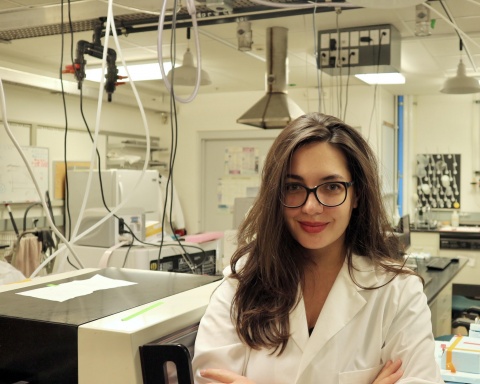
For fifth-year chemical and biochemical engineering doctoral student Konstantina (Konna) Zoga, the pathway from her previous institution in Greece to Iowa was one some of her peers had already traveled. Zoga, who will be graduating this spring, witnessed two of her classmates from the University of Patras make the journey to Iowa before she did.
At the University of Patras, Zoga received her bachelor’s and master’s degrees in chemical engineering. During her time there, she was able to conduct research on wastewater treatments. While her previous degrees had focused on chemical engineering, Zoga knew she wanted to shift towards biochemical engineering due to the department’s strong collaborations and the range of options she’d have following the completion of her degree.
Inside the lab: advancing towards a treatment
After starting her PhD in 2019, Zoga found her way to Dr. Eric Nuxoll’s research group which focuses on tackling bacterial biofilm infections on medical implants. Zoga’s project builds on ten years of research on the thermal treatment of these infections.
“Every year, thousands of patients get a biofilm infection that cannot be cured with antibiotics,” Zoga describes. “The only treatment right now is multiple surgeries to replace the infected implant.”
The infection not only costs hundreds of thousands of dollars each year, but the grueling surgeries can be painful for patients. The Nuxoll Lab is hoping to combat the infection by thermally treating the infected biofilm through localized heat. Zoga’s research progresses the project to mice models.

Nuxoll described Zoga’s work as “Konna's project elevates our work to a new level. We've spent over a decade studying the thermal shock of biofilms in petri dishes. Now we're finally getting to implement this in mammals. This has required a whole new set of skills for our lab which Konna has picked up enthusiastically.”
For Zoga, the project is a piece in the larger goal of finding a treatment for patients. “I can see this as a small step forward for more research in actually developing a treatment for this,” she says. This hope pulled her through during difficult moments in her PhD.
Through collaborations between the Nuxoll Lab and the Department of Orthopedics at the University of Iowa Health Care, the possibility of finding a treatment became more of a reality. The lab received real implants that patients had recently elected to remove to incorporate in their research.
Collaborations were what originally drew Zoga to the Department of Chemical and Biochemical Engineering, and now they’ve created a lasting impact on her studies and furthered the lab’s development of a new therapeutic approach.
“It stops being just a theory on paper. You can actually discuss with doctors,” Zoga says. “You hear about other approaches, get inspired, and even inspire them.”
Aside from advancements in her research, Zoga was also part of the first class of the Iowa Innovation Leadership Fellows Program, which she classifies as one of the most impactful experiences she’s had at Iowa. The program connects graduate students and other scholars across the university with industry leaders and entrepreneurs. For Zoga, this program allowed her to develop her long-term goals through advice on how to transform her research into a product. She saw the program as a combination of her background in engineering and research with her personal interest in development.
Zoga was also awarded a fellowship through Iowa’s Center for Biocatalysis and Bioprocessing, an opportunity that provided her with financial, academic, and professional support. Through the fellowship, Zoga felt that she was able to find a strong sense of community and a supportive network in the biotechnology field.
Outside the lab: support, involvement, and role models
For many international students, moving to the US for studies can be daunting. The Chemical and Biomedical Engineering Department has created systems designed to ease this transition. From the moment students begin their degrees, they are assigned to a peer mentor that can help them figure out where to shop for groceries, what clothes they need to battle Iowa’s weather, and how to navigate issues in graduate school and their personal lives.
Zoga already had connections at Iowa because she had peers from Greece who were pursuing degrees here. She also credits the program’s tight-knit community and peer mentor program for helping her build her support system of peers.
Nuxoll has also played a big role in Zoga’s academic journey. “He not only directs your research and discusses how the results look,” she says, “but he also shares his experiences from when he was a graduate student and listens to me when I’m super excited or frustrated.”

Zoga credits her parents for having the largest influence on her. Her parents continuously supported her journey. Her father was eager to offer help, and witnessing her mother’s academic journey as a kid set an example for what Zoga could achieve. “While I was growing up, I could see my mom studying and pursuing research while she was also working. I could see her doing it with two kids and a full-time job. She’s been a great role model,” Zoga describes.
Outside of her lab, Zoga has found ways to be involved through the department by helping develop their social media and web content. She also serves as the graduate ambassador for the department’s DEI committee which has promoted a welcoming and inclusive environment through different activities and events. For Zoga these involvements helped her grow and take a break from the stressful life of graduate school.
“It wasn’t all about research and experiments and group meetings and results. It helped me evolve as a person as well as a student and researcher.”
While Zoga’s plans aren’t finalized after graduation, she plans to stay in the US and pursue her interests in medical technology and biotechnology fields.